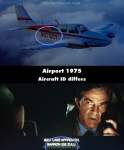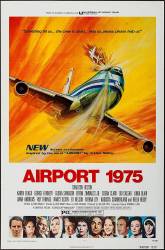
Continuity mistake: The small plane's pilot identifies the aircraft as 232Z. But in the exterior shots, the aircraft's identification is N9750Y. (00:35:00)
Factual error: The scene in which the Beechcraft Baron hits the Boeing 747 in flight plumbs new depths in cinematic absurdity. Assuming both aircraft are at their normal cruising speeds - they appear to be - and the Beechcraft has half a fuel load left, it will hit with the same energy as 7,700 kgs of TNT. The Beechcraft Baron weighed 3,200 kg and the two aircraft would have a closing speed of something like 700 kmh. Even a glancing blow would tear the entire front half of the 747 to bits - there would be virtually nothing of the fuselage left intact all the way back to the wings, and the film shows the two aircraft on course for a head on collision.
Factual error: The 747 takes off from Washington D.C., while there's still some daylight, toward the west coast. Due to complications it's diverted to land in Salt Lake City. The Sun goes down and the plane is shown flying all night long. The Sun even comes back up before they get to Salt Lake. Really, how could it take that long for a jumbo jet to fly a measly couple of thousand miles?
Continuity mistake: Towards the end of the film and in the shot of the 747 as it turns to change course to Salt Lake City the company's name "Columbia" is printed on the aircraft's side on top of a large, white rectangle. After the aircraft comes to a stop on the tarmac the white rectangle is gone and the name is painted directly on its metallic fuselage.
Revealing mistake: When the co-pilot gets sucked out of the plane, it's obviously a dummy.
Continuity mistake: When the Boeing plane is about to land we are shown an aerial view of the flying plane. You can see dirt on the (wind)screen of the plane, from which the scene has been filmed. As the camera turns from left to right, you can see the dirt pass by from right to left. This is not a plane which is escorting, because when the Boeing lands there is nothing else in the air.
Deliberate mistake: The angle of the footage of the Air Force jet (from inside the 747's passengers' viewpoint) observing the 747's damage shows the Air Force jet would be flying away from the 747 instead of flying exactly parallel as the outside footage shows.
Continuity mistake: The pilot that is flying the small plane has a plaid suit jacket on when shown from inside the cockpit. When shown from outside the plane he has a light coloured shirt on.
Continuity mistake: The pilot of the small plane that ultimately collides with the big airliner is speaking with the control tower on his radio. The identification numbers on the wings of the small airplane are not the same numbers that the pilot uses to identify his plane in his conversation with the controllers.
Continuity mistake: In the interior shots the pilot is struggling and in the exterior shots he is flying calmly.
Suggested correction: This is much too vague. Which pilot? Which aircraft? What scene?
Factual error: When the 747 finally lands it makes a hard left turn at the end of the runway. The cutaway to the passengers shows them all leaning to the Plane's left side (due to bodily inertia). For a left turn they should all be leaning to the right.
Continuity mistake: As Murdock is being lowered toward the 747 there's a shot with a POV looking at the Plane's nose from some distance. It's an FX shot, a traveling matte of the actor with a large piece of airplane against a blue screen. The foreground & background elements don't match very well. The distant landscape below is moving linearly in one direction and the aircraft is pointing in quite another.
Suggested correction: That's not necessarily a mistake because of wind drift albeit it's a little exaggerated.
Other mistake: As the rescue copter is lowering down the pilot, it can be seen flying above and in front of the jet so he can enter into the hole above the copilot seat, but passengers looking out of the side windows of the plane can see the copter and that the first guy fails? Not possible.
Factual error: After landing, looks like Charlton Heston is controlling the airplane with the yoke, while on the ground the airplane is steered by means of a steering tiller on the left side.






Suggested correction: What matters is how much of the small plane's kinetic energy was deposited in the 747's structure. A glancing blow would deliver less energy than a head-on collision, because it lessens the total time interval of the impact. Another important thing is if the small plane shattered or stayed largely in one piece during the collision. If it promptly shredded on impact, then each little fragment carried away its portion of the total energy. Smaller pieces of something as light as that plane would immediately get caught in the powerful airflow and be diverted around the 747.
Absolute rubbish. Airliners do not survive mid air collisions.